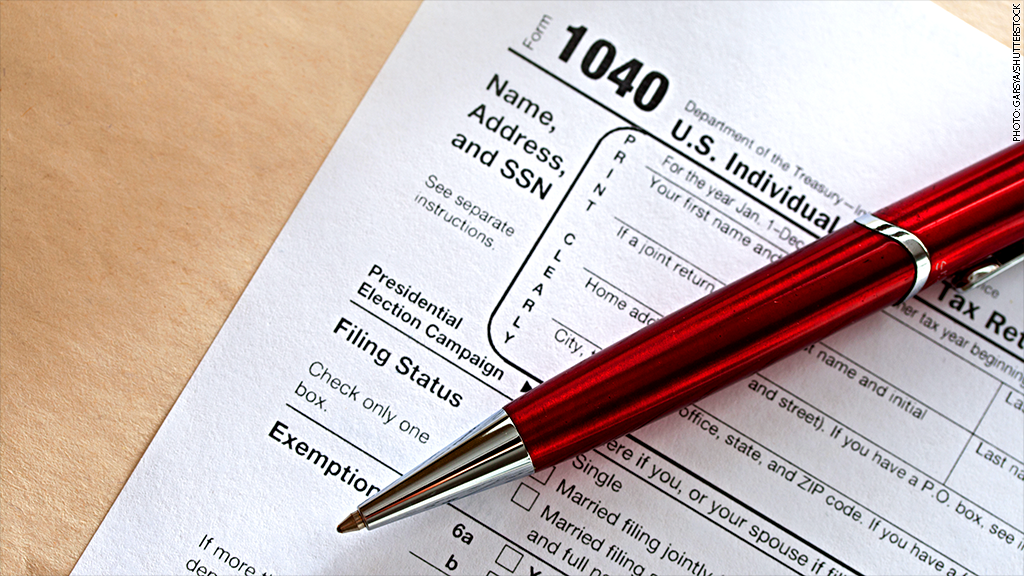
From IRS impersonators to tax preparers behaving badly, scammers are on the prowl this tax season.
Here are "the Dirty Dozen" schemes the IRS is warning about:
1. Identity Theft
The IRS continues to be overwhelmed by identity theft, which occurs when a fraudster uses someone else's name and social security number to claim refunds.
While the agency has been cracking down on the issue -- the number of identity theft-related criminal investigations surged 66% last year -- it still paid out nearly $4 billion in fraudulent refunds last year.
Receiving a notice from the IRS saying that more than one return has been filed under your name is an indication that your identity may have been compromised. In that case, contact the IRS Identity Protection Specialized Unit at 1-800-908-4490.
2. Phone scams
A new scam is gaining popularity, where fraudsters call and pretend to be from the IRS. Some callers demand tax payments and even threaten arrest or other law enforcement action if the person refuses. They may even hang up and call back pretending to be the police. Others tell victims they are owed large refunds and ask for personal information in order to steal their identity.
If you believe you're a victim of this scam, call 1-800-366-4484.
Related: Tax preparer horror stories
3. Phishing
If you receive an e-mail that appears to be from the IRS and asks for personal information, it's most likely a phishing scam that wants your identity and your money. The IRS does not reach out to taxpayers via e-mail, texts or social media, so relay any such messages to phishing@irs.gov.
4. "Free Money"
Be wary of fliers and ads promising "free money" from the IRS or anyone offering a refund that sounds too good to be true.
Some scammers target low-income and elderly people, often through churches, convincing them to claim credits they aren't entitled to -- and even Social Security rebates that don't exist. These con artists often charge up-front fees and disappear without a trace before the IRS rejects the claims. The victims don't just lose the scammer's "fee" -- they could also get hit with a $5,000 penalty for making intentional errors on their return.
5. Return preparer fraud
From inventing extra children to stealing identities, some preparers are bad news.
Make sure your tax preparer has an IRS Preparer Tax Identification Number (PTIN). If a preparer doesn't put this number on your tax return as required, or fails to sign the form, that should raise a red flag. And watch out for preparers who base fees on the size of your refund.
Related: Most Americans plan to save their tax refunds
Complaints about shady tax preparers can be submitted via Form 14157.
6. Hiding income offshore
Don't let anyone convince you it's a good idea to hide income abroad. The IRS has been cracking down on taxpayers who do this and has collected billions of dollars in back taxes and penalties from tax cheats since 2009.
If you have a legitimate account abroad, you won't get in trouble if you properly complete the reporting requirements. But by failing to disclose assets held in offshore accounts, you risk huge penalties -- including a fine of $100,000 or 50% of the account balance, whichever amount is greater.

7. Fake charities
It's common for scammers to create fake charities to fraudulently collect money -- especially in the wake of disasters. Before giving money to a charity, verify that the organization is legitimate and that your donations will be tax deductible by using the IRS's Exempt Organizations Select Check. And don't give cash -- use a check or credit card so you have proof of payment.
8. Inflating income and credits
Boosting income or expenses to get bigger credits than you deserve can get you in big trouble with the IRS. If you get caught, you'll have to return any fraudulent refund and pay interest and penalties on any amount owed.
Related: How to lower your tax bill
9. Frivolous arguments
Trying to get out of paying taxes? Here are some arguments that will never work: Filing a tax return is voluntary, only gold-based money is taxable or your state isn't part of the United States. Anyone who tries to tell you differently can't be trusted. These are considered frivolous arguments and will be rejected, and you could face a number of penalties.
10. Falsely claiming no income
Taxpayers who fall prey to schemes convincing them to falsely report their taxable income as zero could face a penalty of $5,000.
11. Evading taxes
Some shady investment advisers and tax preparers are creating and promoting complicated tax structures and shelters that clients can use to evade taxes -- often involving multiple entities and offshore accounts. If someone has tried to convince you to evade taxes, report the incident using Form 14157.
12. Abuse of trusts
Common schemes recommend you transfer money into trusts to reduce your income and avoid paying taxes. While there are appropriate uses of trusts, the IRS has seen a growing number of people improperly use them. The rules governing trusts can be very complicated, so to avoid getting caught up in an illegal arrangement, the IRS recommends consulting with a tax professional.
